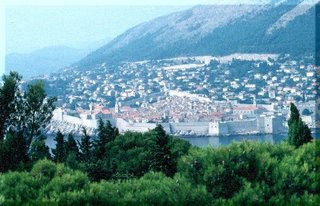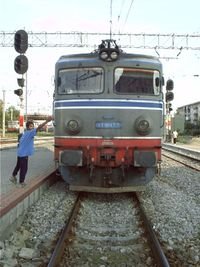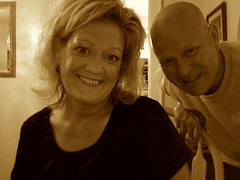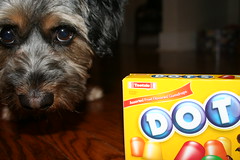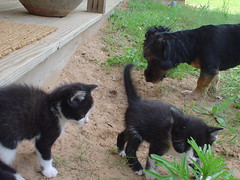Situation Normal All **bleep** Up
 Congress shall make no law respecting an establishment of religion, or prohibiting the free exercise thereof; or abridging the freedom of speech, or of the press; or the right of the people peaceably to assemble, and to petition the government for a redress of grievances.
Congress shall make no law respecting an establishment of religion, or prohibiting the free exercise thereof; or abridging the freedom of speech, or of the press; or the right of the people peaceably to assemble, and to petition the government for a redress of grievances.This is the Big One, folks. The First Amendment to the United States Constitution Bill of Rights. The numero uno freedom we enjoy as American citizens. My right to free speech comes before my right to keep and bear arms, my protection against unreasonable searches and seizures, my guarantee of a speedy and public trial and my safety against cruel and unusual punishments.
Protecting the First Amendment is paramount. But governing free speech has become a philosophical and bureaucratic nightmare.
Enter the Federal Communications Commission.
Because of the antics of scum-sucking, glory-seeking, pathetic losers like Howard Stern and Janet Jackson, the FCC has gone completely crazy. Completely crazy. To quell the uprising of public fury resulting from the actions of said scum-sucking, glory-seeking, pathetic losers, the Commission has taken on “indecency” in a big way. As a result, the pre-10:00 p.m. “safe harbor” is in affect, each infraction will cost the offending broadcast entity $325,000, and three infractions gets your broadcasting license suspended. These penalties now have the teeth that they’ve never had before.
I find it ironic that the organization originally chartered to protect freedom of speech finds themselves in the precarious position of having to squelch the first amendment, all because the balance of reason has been tipped by scum-sucking, glory-seeking, pathetic losers. And I can’t really blame the FCC. The public outcry and the conservatives in power are forcing their hand. They had to do something to respond to abuses that are beginning to mount up in big ways on commercial television. I actually give the Feds tons of credit for being as rational as they have been up to this point. You see a lot of garbage and questionable stuff on television but until now the FCC has been reticent to engage in the business of censorship.
Enter PBS.
Poor long-suffering PBS. One of my real, true loves. It’s a constant fight for survival. We never have enough money, there is always a political agenda at play somewhere and we’re losing audience to cable and satellite channels at alarming speed. And like we don’t have enough to deal with, we now have to adhere to the new smack down imposed by the FCC.
Enter KCSM in San Mateo, California.
KCSM is one of the PBS system’s smallest stations. Like every other station in the system, a few years ago (pre FCC regulation changes) KCSM aired the highly-acclaimed, nationally promoted Martin Scorsese project The Blues. This is an awesome five-part documentary chronicling the history of this truly American art form. The production quality was amazing, the storyline compelling and the music is amazing. The Blues received high ratings. As part of their recent pledge efforts (post FCC regulation changes) KCSM decided to re-air a particular episode from the series called The Godfathers.
This segment featured interviews with some of the greatest living blues musicians. For the sake of the point I will eventually make, it bears emphasizing that these guys are old BLUES MUSICIANS. They probably haven’t seen sunlight in 40 years. They live in dark, smoky bars playing wicked good music that talks about lost love, cheating hearts, hard living, getting it on and the struggles of making it in this big, bad world. With its roots in the hard fought arena of slavery the blues is really an outlet for escapism and expression of the darker side of life. It’s not happy, cheery, smiley music! It’s raw, soul-searing, heave your guts out, bump and grind music.
So… is it any surprise that some of these blues masters might be a bit rough around the edges? A little bit salty in their vernacular? Not afraid to tell it like it is? NO! That’s who they are, and who they are was the entire focus for the documentary. During the interviews of that program segment one guy said “shit” and one guy said “fuck”.
But let’s put this in context. The guy did NOT say a line like this: “So I said, shit Muddy, what the fuck are you doing?” It was not even that direct. It was something more like this. “So I said Muddy you better get of there fast and he ran out of that club like he was on fire. Sheeee…t”. And, “It was the saddest moment of my life….. (whisper to self) fuck…. I just couldn’t believe that he was dead.” Given the subject matter at hand and the context in which the words were said, they were NOT gratuitous in any way. This was the actual language of the documentary’s participants and deleting it would have deprived the program of its authenticity.
But with its new rules and regs in place, the FCC slapped little KCSM with sanctions and a $650,000 indecency fine. That is an exorbitant amount of money for almost any PBS’s meager budget to handle, but it would certainly bankrupt KCSM. The largest PBS producing stations, including the mothership WGBH, are rallying and organizing and protesting and going through all of the official channels to get this sanction reversed. This has rocked the PBS world and the whole system is up in arms because this is so unreasonable.
Public broadcasters recognize that the Commission’s obligation to enforce the prohibition against the broadcast of indecent material requires that it strike a delicate balance between that requirement and the limitations on censorship in the Communications Act and the First Amendment. Nonetheless, the Commission struck the wrong balance when it issued its notice against KCSM. That decision not only threatens to penalize KCSM (and by extension all PBS stations) for the broadcast of a serious documentary about a major and distinctively American musical form, but also has and will adversely affect public broadcasting’s ability to fulfill its mission of providing long-form, in-depth, insightful, creative and innovative programs the public expects and supports.
Enter the humor in all of this.
Poor beleaguered PBS is trying to do the right thing by cooperating with the FCC but it’s a bitter pill. On one hand they are railing against censorship and on the other hand they are painstakingly making sure stations and producers edit their material for content.
It’s been reduced to this. Here is an excerpt from a recent email from PBS Legal:
“In instances when course language in a program is to be edited (wiped or bleeped) in connection with a “compound word,” the entire word **does not** need to be edited. One example might be “motherfucker.” Where most recently we required editing of the entire word, effective immediately, only the “fucker” part of the word needs to be edited. Editing just the “uc” in “f**ker” is not acceptable.) The memo goes on to say, “In any scene where an individual utters the word “fuck” or “shit” (or any variant of either word) while facing the camera such that any ordinary viewer could ascertain from the speaker’s lips what was said, the lips of the speaker need to be pixilated. There’s more…the Commission has held that words such as “dick”, “dickhead”, “pissed off”, “up yours”, “wipe his ass,” and “fire her ass” might be acceptable based on the context in which they are used.
Pure crazy.
Since its inception public broadcasters have been committed to presenting challenging, creative and informative programming and these programs have received high praise from both critics and the public, who expect public broadcasters to present current and historical events accurately and to portray dramatic and artistic work faithfully. Public broadcasters, which have governing boards drawn from their communities and are dependent on local viewers for support, are keenly aware that to fulfill their mission effectively, they must assume that their programming is consistent with their communities’ sense of what is appropriate.
There are dozens of upcoming PBS programs at risk, but here is one example. Ken Burns is coming out with his most recent documentary and this one will be called The War. Word is this World War II retrospective is some of Ken’s best work (for the sake of full disclosure, I am a Ken Burns devotee. I think he’s amazing. What he did with the Civil War series impacted lives and changed forever the way documentarians portray history. From Jazz to Baseball to American Stories, I’ve loved everything he’s done.) There is some concern that parts of his upcoming work will have to be censored – a frontal nude shot of a man in a Nazi concentration camp, some salty language one soldier is using when he’s describing his utter fear during the death march, the reactions of some to the dropping of the bomb, etc. Again, none of this is gratuitous, but rather an integral part of the story. But will PBS stations with the most bare-bones of budgets take the chance on airing a sure fire ratings winner that might bring down the heavy hammer of the law, steep fines and sanctions again their licenses? It will be interesting to see how this plays out.
So I find that I’ve come all this way in my diatribe and don’t really know my ultimate point. Do I blame the FCC for cracking down on indecency? Absolutely not – they had to react to what was coming from the scum-sucking, glory-seeking, pathetic losers that were running rampant. I don’t want my little nieces subject to that garbage so something had to be done to try and rein them in. Do I blame PBS for enforcing stronger controls around editing content? Absolutely not – as public broadcasters we have a responsibility to adhere to the rules of the FCC. But do I think any of this is right? No. My beloved PBS is the home of the absolute best long-form, in-depth, insightful documentaries and these new rules may damage its ability to objectively tell the whole story.
This is all just an unfortunate situation brought on by an awful few. Our country’s forefathers knew that free speech and free press were integral to our success as a democracy, but I wonder if they ever imaged to what degree our citizens would push the limits? But I do believe this... if our forefathers were standing as both judge and jury, knowing all of the facts, they would without hesitation unanimously rule to...free KCSM!

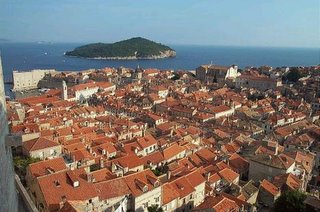
 It was midnight, quiet and kind of chilly as Log and I walked from the docks to the train station in Split, Yugoslavia.
It was midnight, quiet and kind of chilly as Log and I walked from the docks to the train station in Split, Yugoslavia.


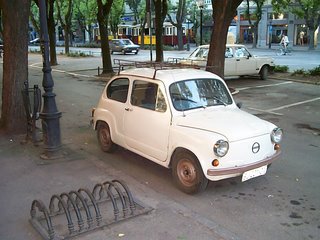 In total Log and I spent about five days in Dubrovnik. We did things at a leisurely pace and took our time meandering through the old town. We had an extremely limited budget but we were still able to enjoy ourselves.
In total Log and I spent about five days in Dubrovnik. We did things at a leisurely pace and took our time meandering through the old town. We had an extremely limited budget but we were still able to enjoy ourselves.

